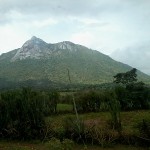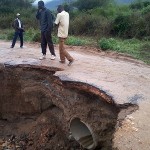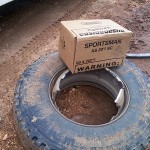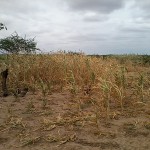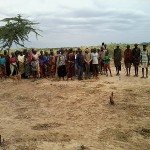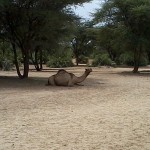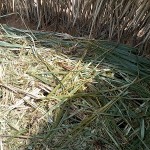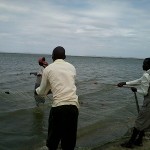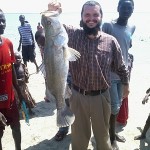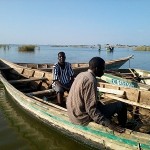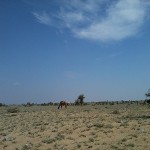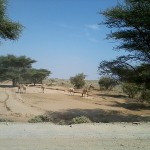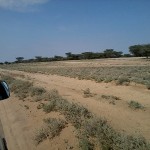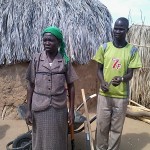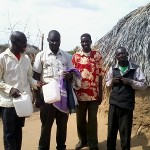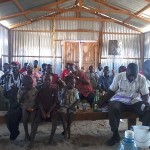The team returned to Turkana country for a follow-up mission this week. The mission team (see photo) included Silas, Henry, Tonny, me, and the coordinator John, who made the initial connections with the people in Lodwar. It was another long, hot and bumpy journey (photos). We experienced a broken rim on the bus in a bad area (photo). An official on the bus said the nearby herd of cows made him nervous because the Pokot shepherds are known to carry machine guns. He stated earlier armed locals robbed stranded folks of everything they had including their clothing. They would have seen some blinding whiteness if that happened to our bus! Well we arrived in Lodwar at about 10 PM and then ate dinner. I learned that our guest house is really a brothel. Praise God they change the bedding daily. Silas was teaching the working girls and convinced one to pack up and go home and she did. Praise God.
After dinner there was a terrible incident I hate to even describe. But things are different in the remote areas of the desert. A crowd had gathered around an unconscious man laying in the street. Bystanders said he was hit by a motorbike. No one lifted a finger to help him. Silas and Henry investigated first and then joined the rest of the team. They told me about the injured man and I went to see if we could get him to a hospital. Silas is the only one who tried to help me. We could not get a car and Silas wanted to put him on a motorbike. Then the crowd started changing their story and saying he was a robber who was injured by vigilantes for stealing a phone. Even my team discouraged any action. So we just let the man lay there. All I could think of was the parable of the good Samaritan. Even if he was a robber, I did not feel right but was powerless without their cooperation as I do not speak the languages necessary to get anything done. And assisting a robber is considered very wrong in Africa. I needed cooperation.
We returned to our room and called it a night. I pondered his injuries and concluded that whether he lived or died, local medical capabilities would not make the difference. He suffered blunt head trauma and was unconscious with occasional seizures. Not good. But Silas could not rest. He returned to the scene alone hours later and the man was alone in the street, the crown having disbursed. He had no money and it was the middle of the night. He just stayed there and the man eventually died. You see, Silas knew the crowd was lying. The person who instigated the stories was the murderer who fought him over a girl. I learned all this the next morning. This is a sad testimony of the severity of life in Africa and total disregard for our fellow man. Only Christ can change these people.
The next day we met in our guest house (brothel by night) to teach agricultural methods effective in their area. It was a modified version of Farming God’s Way. But their issues run deeper. No soil and no rain! That is a big problem for agriculture. But I taught them in the classroom and hands-on in the field to dig out a small area about 10 inches deep and import soil from ant hills, rich muck from the river flood plain, and compost. Then we applied about six inches of mulch over the new soil. Add water and voila! Wait for God to do the rest. We planted a bed of tomatoes (see photo) to test this at a pilot scale. If it works, they will be encouraged to take it to commercial scale. To do the project we purchased them a wheel burrow, shovel, jembe (heavy hoe), machete, and file to sharpen the tools.
The second agricultural project was evaluating a cooperative farm for irrigation. It is a farm managed by about 100 local Turkana people (photo) consisting of 100 acres (photo). It is located on a flood plain and is adjacent to the river, which is a dry bed much of the year. Now they wanted someone to come in and install a well and set them up. However, their water demands and the lack of power inhibit this as being practicable. I put my hydrogeologist hat on (I am a degreed geologist, geophysicist, and hydrogeologist) and scoped out their situation. They reside on a flood plain with water is less than 10 meters deep with loose fluvial sediments. Think big water demands. Think no power and no heavy equipment. Solution: irrigation pond. They need to get some cattle and dredge/scrape/plow a large pond and install a diesel pump. Think America before the invention of the excavator. Most of the ponds and lakes built in America were built this way. They really have everything they need to do the job. They just needed a push in the right direction. Besides that, if they really want a well, at 10 meters, they just need a shovel and a bucket. Their next assignment is to dig a hole and definitively determine depth to water and ensure bedrock is not encountered.
Next day was a trip to Lake Turkana. This was a two hour rough ride through the desert (photo). Occasional goats, camels, and Turkana villages are all that break up the barrenness. Once lakeside, we were greeted by the Chief who is also a pastor. He hosted the meeting. We then had to board a boat to access the peninsula where we would be teaching. For most of us, this was no big deal; but for Tonny and John: major problem. These guys feared the idea of traversing the one-mile harbor in a boat tremendously. After a half hour of cajoling them, we finally gave up and left them on shore. However, shortly after we left we saw them board another boat and follow us to the other side.
At the other side we watched the locals gather in their catch by net on shore (photo). It was incredible. Reminds me exactly of what James, John, Peter and Andrew experienced in Lake Galilee. Lake Turkana is an awesome fishing spot. It is so remote, and roads so bad, there are only boats on the lake that are locally made. Therefore, this enormous lake is barely fished. Results: some incredible fishing! I would love to take my boys here but the risks are too numerous.
I then taught a group of seven pastors and about 40 church members (photo) the Gospel of the Kingdom, house church planting, Luke 10 evangelism, and multigenerational discipleship. It was very well received. They said this was exactly what they needed to reach the unreached deep into the interior places.
During a break we wandered back to the lakeside. On shore someone just pulled in a 15-20 pound fish that looks like a bass (see photo). We bought several huge tilapia right there and ate good the next couple of days.
After the teaching the Chief insisted I come back. I want to, really, but my schedule and budget prohibit it. Now these folks are desperate for Bibles and I only wish I had carried more. I only brought five with me but had a few more at home but lacked room in my luggage. I will have to send them some somehow.
I just marvel at our God who put this vast resource in the middle of a desert. What a blessing for the local people. Without the lake, they would have nothing. Pray for the people Ferguson Gulf, Lake Turkana.
We them traveled back to Lodwar in preparation for the next meeting in Lokichar, about three hours from Lodwar. The next day we boarded a small van for Lokichar (photos of camels on the way). When we arrived at noon, we found five pastors who had been waiting for two days for us to arrive. Two pastors walked day and night 70 kilometers to attend the meeting. Another traveled 40 kilometers. Try to get an American who is that committed to learn from God!
I taught all day and they were blessed. These are serious folks and now they have been given knowledge and tools to reach deep into the interior places of Turkana land. We will marvel one day at the impact that the teachings and literature will have at reaching the unreached in this harsh area. These are literally unreached peoples we are talking about who do not even know about the Bible, God, and Jesus Christ. I praise God for the opportunity to mobilize the people who will reach them
So I want to thank all of you who have been praying with us and supporting this work financially. When this mission was launched, there remained only $792 in the mission bank account. Well, reaching the interior places is not cheap. We used a total of $752 to fund this mission. It is not easy work; the team endures many hardships to embark on missions to these remote areas. But we are willing, for the God we serve and the people we reach. However, we can’t do it without your help…both prayers and financial support.
God bless you.
Marc Carrier

